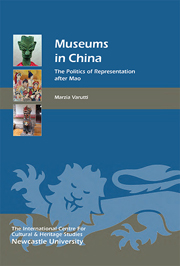Book contents
- Frontmatter
- Contents
- List of Illustrations
- Acknowledgments
- Chronology
- List of Abbreviations
- Introduction
- 1 Cultural Heritage in China
- 2 Museums in China: origins and Development
- 3 New Actors in the Chinese Museum World
- 4 Museum objects and the Chinese nation
- 5 The nation in the Museum
- 6 The Politics of the Past
- 7 The Representation of the Past in China's Museums
- 8 The Politics of identity
- 9 The Museum Representation of ethnic Minorities
- 10 Techniques and sites of Display of ethnic Minorities
- Conclusions: The new Museums of China
- Appendix: List of Museums in China Visited by the Author
- Bibliography and References
- Index
- Heritage Matters
7 - The Representation of the Past in China's Museums
Published online by Cambridge University Press: 05 March 2014
- Frontmatter
- Contents
- List of Illustrations
- Acknowledgments
- Chronology
- List of Abbreviations
- Introduction
- 1 Cultural Heritage in China
- 2 Museums in China: origins and Development
- 3 New Actors in the Chinese Museum World
- 4 Museum objects and the Chinese nation
- 5 The nation in the Museum
- 6 The Politics of the Past
- 7 The Representation of the Past in China's Museums
- 8 The Politics of identity
- 9 The Museum Representation of ethnic Minorities
- 10 Techniques and sites of Display of ethnic Minorities
- Conclusions: The new Museums of China
- Appendix: List of Museums in China Visited by the Author
- Bibliography and References
- Index
- Heritage Matters
Summary
National history and national heritage are often juxtaposed to complement and support each other: the former provides a cohesive narrative and a context for the heritage, while the latter materialises an otherwise abstract past. In museums, the past is transformed into heritage through processes of selection, interpretation and memorialisation. Museums are sites where collective ideas are formed, nurtured, validated, disrupted and contested. In other words, they act as sites of both memory and counter-memory (Zemon Davis and Starn 1989). What makes museums special repositories of memory is the presence of objects. Objects transform museums into treasure houses preserving stories and remembrances, evoking emotions and dreams. Museum objects have the potential to act as sensory, cognitive and emotional catalysts. Susan Crane (2000, 2) notes that ‘being collected means being valued and remembered institutionally; being displayed means being incorporated into the extra-institutional memory of the museum visitors’.
If history, as the historian Bo Stråth (2005, 256) puts it, ‘is a translation of the past into our time, an act of interpretation’, then museum representations of history embody yet another layer of interpretation and can be understood as sites of meta-translation. While memories are highly subjective, ‘history usually depends on someone else's eyes and voice: we see it through an interpreter who stands between past events and our apprehension of them’ (Lowenthal 1985, 216). The interest in focusing on the museum representations of historical events rests precisely in the aptitude of museums to act as media and interpreters.
- Type
- Chapter
- Information
- Museums in ChinaThe Politics of Representation after Mao, pp. 103 - 120Publisher: Boydell & BrewerPrint publication year: 2014



